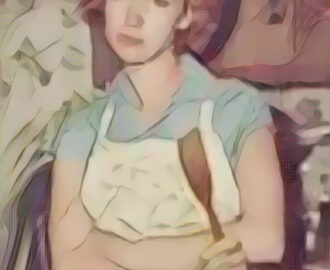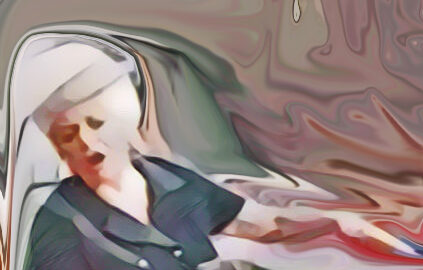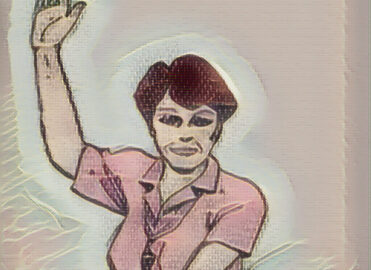(gap: 1s) Although I’m almost 60 now, the memory of a particular winter evening in the 1960s remains as vivid as if it happened yesterday. The world outside my window was shrouded in darkness, the cold pressing against the glass, while inside, the air was thick with the scent of old radiators and the faint, comforting aroma of my mother’s lavender talcum powder. I was tucked beneath heavy blankets, my small body wracked with a persistent chest cold. Each breath rattled in my lungs, and my head throbbed with fever. The room felt both safe and stifling, a cocoon of childhood and illness.
(short pause) My mother entered quietly, her footsteps muffled on the worn carpet. She carried a tray, as she always did when I was unwell, but that night the tray seemed to loom larger than ever. On it sat a bottle of thick, black cough syrup that glistened ominously in the lamplight, a huge jar of Vicks Vaporub, her beloved Ponds cold cream, a heavy tablespoon, and a neat stack of flannel cloth rags with safety pins gleaming on top. The familiar ritual should have been comforting, but I was tired, irritable, and desperate for some sense of control.
(pause) My mother was a woman of quiet strength, with a calm, capable manner that never wavered, even in the face of childish rebellion. Before she had children, she had been a nurse in the 1960s—a time when hospitals were ruled with a rod of iron by formidable matrons, and discipline was as much a part of the daily routine as medicine. She had given up her profession to raise us, but the habits and expectations of those strict hospital wards never truly left her. She was used to order, to brisk efficiency, and to the idea that nonsense was not to be tolerated—least of all from her own offspring. Her hands, gentle yet firm, had soothed fevers and bandaged wounds, but they had also learned to command respect, and she brought that same sense of authority into our home.
(pause) I told her, with a defiance I barely recognized in myself, that I wanted no part of her remedies. My voice, hoarse and trembling, echoed in the small room. She looked at me, surprised—her eyes a mixture of concern and hurt. She explained, gently but firmly, that I was sick and the Vicks would help. But something in me snapped. I began to shout, my words tumbling out between coughs, calling her old-fashioned, insisting the medicine was useless and foul-smelling, and finally, in a burst of childish cruelty, declaring that she must be stupid for believing in it.
(pause) For a moment, the room was utterly silent, the only sound my ragged breathing. My mother’s face changed—her expression closed off, her jaw set. She set the tray down on the nightstand with a quiet finality, and in one swift, practiced motion, she pulled back my covers. I barely had time to protest before she took my arm, her grip gentle but unyielding, and sat on the edge of the bed. In an instant, I found myself draped awkwardly over her lap, my cheek pressed against the cool cotton of her house dress, the world suddenly upside down.
(short pause) My mother’s approach was always firm, but never cruel. Spanking was rare in our house, reserved for only the most serious offenses, and she made it clear that this was not done in anger, but out of a sense of duty. I could feel the tension in her body, the way she steadied herself, her hand resting for a moment on my back as if to remind me that she was still my mother, even in this moment of discipline. Then, with a measured resolve, she delivered each smack—sharp, stinging, but never excessive. The sound of her hand against me echoed in the small room, mingling with my cries and the distant tick of the hallway clock. My face burned with shame, tears springing to my eyes before the first sob escaped. I remember thinking, even as I wept, that her arm must be aching, but her resolve did not waver until her anger had ebbed and the lesson was imparted.
(pause) The atmosphere was thick with emotion—my own humiliation and pain, but also my mother’s sadness at having to punish me. There was no triumph in her actions, only a quiet, unwavering sense of responsibility. As the spanking continued, I could sense her struggle: the firmness in her voice as she reminded me why I was being punished, the gentle but unyielding grip on my arm, the way she paused between smacks to let the lesson sink in. I was aware, even in my distress, that this was not about anger, but about teaching me respect and boundaries.
(short pause) When it was over, I crawled back beneath the covers, my body shaking with sobs. My mother’s voice was quiet, almost weary, as she told me she would now tend to my cold—and that if I ever spoke to her that way again, she would fetch the slipper and put me back in diapers. The threat, though never carried out, was enough to silence me completely. I lay there, my pride in tatters, the only sounds my hiccuping breaths and the soft rustle of her preparations.
(short pause) As she worked with the same gentle efficiency as always, spooning the bitter syrup into my mouth, her hand cool and steady on my forehead, I felt the sting of discipline begin to fade, replaced by a deep sense of remorse. The Vicks was thick and pungent, its menthol sting making my eyes water as she smeared it across my chest, neck, and back. The flannel rags, warm from the radiator, were pinned snugly to my pajamas, their scratchy texture oddly comforting. The final indignity was the cold cream, its floral scent clinging to my skin, a reminder of her femininity and my own helplessness.
(pause) Before she left, she set up the vaporiser, its gentle hiss filling the room with swirling menthol clouds. The air grew heavy and damp, the sharp scent mingling with the lingering traces of tears and shame. My bottom throbbed, my ego bruised far worse. As she tucked me in and kissed my forehead, I felt a strange mixture of resentment and longing—a desperate wish to be grown up, and an aching need for her comfort. The room, once so familiar, now felt transformed: a place of discipline, but also of care.
(pause) The treatment was repeated three times the next day, and on many other occasions throughout my childhood. Each time, the ritual was the same: the tray, the medicine, the gentle hands, and the unspoken bond between mother and child. Looking back, I realize those moments were not just about illness or discipline, but about love—tough, imperfect, and enduring. Even now, the scent of Vicks or the sight of a flannel rag can transport me back to that small, lamplit room, and the complicated, unbreakable thread that tied me to my mother.



























































